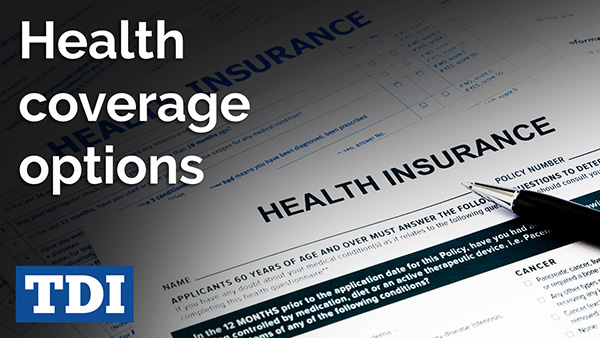There are several types of health insurance coverage, including private, group, medicare, medicaid, and short-term insurance plans. Health insurance coverage is an essential tool to help individuals pay for medical expenses that may otherwise be unaffordable.
It is important to understand the different types of health insurance to make an informed decision about your coverage options. Private health insurance coverage is purchased individually or through an employer, while group health insurance coverage is provided by an employer.
Medicare and medicaid are government-funded health insurance programs, with medicare covering elder citizens and medicaid offering coverage to individuals with low-income. Short-term insurance plans offer temporary coverage for a specific period and are typically cheaper than traditional plans. Understanding your health insurance options ensures you make well-informed decisions and receive appropriate medical care when needed.

Credit: www.arcbenefitsolutions.com
Table of Contents
A Closer Look At The Various Health Insurance Coverage Options Available
Health insurance coverage can come in various types. Some common options include individual plans, family plans, group plans through an employer, and government-sponsored plans like medicaid and medicare. Each type of coverage has its own benefits and limitations. It’s important to thoroughly research and compare plans to find the best one for your individual needs.
Cost, coverage details, and provider choices should all be taken into consideration. When selecting a plan, it’s also important to understand the terminology used by insurance companies, such as premiums, deductibles, and co-pays. With careful consideration and research, finding the right health insurance coverage can provide peace of mind and access to necessary medical care.
Health Maintenance Organization (Hmo) Plans
Health maintenance organization (hmo) plans are a type of health insurance coverage that typically requires the insured to receive medical care only from providers within the plan’s network. Hmos are designed to control healthcare costs by promoting preventative care and regular check-ups.
These plans often have lower out-of-pocket costs, but require pre-authorization for certain medical procedures and may limit coverage for out-of-network care. Some hmos also offer services such as health and wellness coaching, mental health services, and disease management programs. It’s important to carefully review the details of hmo plans before enrolling to ensure that they meet your healthcare needs and fit your budget.
Preferred Provider Organization (Ppo) Plans
A preferred provider organization (ppo) plan is a type of health insurance that allows you to choose your doctors and hospitals. In this plan, you have the flexibility to see any healthcare provider, but you’ll pay less if you use providers within the network.
Ppos typically have higher premiums but offer lower copays and deductibles. It’s important to check if your preferred doctors and hospitals are included in the ppo network. With a ppo plan, you won’t need to get a referral to see a specialist.
This type of plan is ideal for those who want more control over their healthcare decisions and are willing to pay a higher premium for that flexibility.
Exclusive Provider Organization (Epo) Plans
Exclusive provider organization (epo) plans are a type of health insurance coverage that restricts you to a particular network of providers. These plans don’t allow you to get care from providers outside of the network, except in an emergency. Epos are designed to keep costs down by limiting the providers that their patients can see.
The network of providers in an epo plan is usually chosen based on the quality of care that they provide, as well as their costs. Patients who choose an epo plan will usually have lower premiums compared to other plans but may pay more out of pocket for care received outside of the network.
Point Of Service (Pos) Plans
Point of service (pos) plans are a hybrid option that blends characteristics of health maintenance organization (hmo) and preferred provider organization (ppo) plans. Pos plans combine the cost-saving features of hmos with the choice of providers found in ppos. Pos plans develop a primary care physician (pcp) network, which is like an hmo.
Members can also visit doctors outside of the network, similar to the ppo setup. Usually, pos plans offer preventive care benefits and member education programs as well. In general, pos plans could be the best option for those who want to balance control over their healthcare decision-making and lower healthcare costs.
High Deductible Health Plans (Hdhps)
A high deductible health plan (hdhp) is a type of health insurance that features a lower monthly premium compared to other plans. However, hdhps come with a higher deductible that must be paid out of pocket before insurance coverage kicks in.
The internal revenue service defines hdhps as plans with a minimum deductible of $1,400 for individuals and $2,800 for families. Hdhps are often paired with a health savings account (hsa), allowing individuals to use pre-tax dollars to pay for out-of-pocket expenses.
With an hsa, any unused funds from a year can be kept and rolled over to the next year. Hdhps are often a good choice for those who are healthy and don’t require frequent medical care.
Frequently Asked Questions Of What Are The Different Types Of Health Insurance Coverage?
What Are The Different Types Of Health Insurance Coverage?
Health insurance coverage can come in various forms, such as hmo, ppo, epo, pos, and hdhp. Each type has its own benefits, restrictions, and cost. Understanding these types can help you choose the right coverage that suits your health needs and budget.
What Is Hmo Plan?
Hmo (health maintenance organization) is a type of health insurance plan that requires you to choose a primary care physician (pcp) who will manage and coordinate your healthcare. It usually has lower out-of-pocket costs, but you have limited healthcare providers to choose from.
What Is Ppo Plan?
Ppo (preferred provider organization) plan is a type of health insurance that offers a network of healthcare providers. You have the flexibility to choose any healthcare provider, but you’ll pay less if you stay within the network. Ppo usually has higher out-of-pocket costs than hmo.
What Is Epo Plan?
Epo (exclusive provider organization) is similar to ppo, but you’ll only be covered if you use in-network healthcare providers. It typically has lower out-of-pocket costs than ppo, but more expensive than hmo. Epo offers no coverage for out-of-network healthcare providers.
What Is Pos Plan?
Pos (point of service) plan is a hybrid type of health insurance plan that combines features of both hmo and ppo. You’ll select a primary care physician, like in hmo, and you can also see out-of-network healthcare providers by paying more, like in ppo.
Pos usually has higher out-of-pocket costs than hmo, but lower than ppo.
What Is Hdhp Plan?
Hdhp (high deductible health plan) is a type of health insurance plan that has a high deductible, but lower monthly premiums. It offers tax benefits for those who qualify. You’ll pay for most of your healthcare costs out-of-pocket until you reach the deductible, after which insurance will cover most of the remaining costs.
Conclusion
Considering the different types of health insurance coverage available, finding the right fit for your individual needs is crucial. The more you research and familiarize yourself with these policies, the better equipped you will be to make informed decisions. Whether you opt for a traditional fee-for-service plan, a health maintenance organization or a preferred provider organization, each will have its unique benefits and drawbacks.
It’s essential to understand the differences between them and how they will affect your access to healthcare before choosing one. While determining the optimal health plan may seem daunting, healthcare providers can assist you, provide answers to your questions, and recommend the best coverage option for your specific medical needs.
Remember, health insurance coverage is a necessity, so review and compare different plans, seek professional advice when making your decision, and guarantee a secure future for you and your loved ones.
